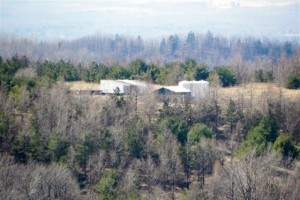Indiana County township claims ecosystem has legal rights
-
Susan Phillips

Courtesy of Marianne Atkinson
The Irvin deep injection well in Clearfield County is operated by Exco Resources.
A battle over personhood is brewing in the tiny rural community of Grant Township in western Pennsylvania’s Indiana County. And that fight is now in the courts, where a federal judge will have to decide whether the “personhood” of an ecosystem trumps the “personhood” of a corporation.
Back in June, Grant Township banned frack water disposal wells. This came about three months after the Environmental Protection Agency approved a project by Pennsylvania General Energy Company to turn a former producing gas well, into a disposal well. Instead of drawing out gas, the company wants to inject waste water from its other oil and gas operations into the underground space now empty from the well’s prior production. Residents say they worry that the disposal well will leak the waste into the Little Mahoning watershed, and contaminate their drinking water supply.
In August PGE filed a federal lawsuit to reverse the ban, arguing the ordinance unconstitutionally strips the company of its rights. But residents are pushing a novel legal strategy. In a filing this month, attorneys for the community argue the Little Mahoning ecosystem itself has rights, and deserves standing with the courts. Recognition that corporations have legal standing, and therefore “personhood” in the eyes of the courts has a long history in the United States. But this may be the first time any court in Pennsylvania has had to decide whether an ecosystem has similar legal protections. The motion filed in November by attorneys representing Grant Township argues that nature is not simply property that can be owned, but that it has its own rights to “exist and flourish.”
For the Little Mahoning Watershed, its very right to exist is threatened by this litigation. If the Court strikes the ordinance, it would legally eliminate the Watershed’s rights, and also authorize PGE to engage in waste depositing activities that would physically impair those rights.
Grant Township resident Stacy Long admits it’s an abstract concept.

Adapted from the National Energy Technology Laboratory / Environmental Protection Agency
Diagram of a deep well injection disposal site.
“If a corporation has the same rights as a human being to assert their will why not an ecosystem?” Long told StateImpact. “The ecosystem has a life, it has presence, it has being. The ecosystem can have a say in this.”
Grant Township’s ordinance banning the well is referred to as a “community bill of rights.” These ordinances have been promoted by the Community Environmental Legal Defense Fund, which promises to defend them in court. The nonprofit helped the city of Pittsburgh pass its ban on fracking. And several other Pennsylvania municipalities have passed their own versions of a community bill of rights.
Tom Linzey, the executive director of CELDF, says the ordinances are a result of frustration with state and federal regulations that he says don’t protect the environment and public health. Resident Stacy Long agrees.
“There’s no reason to believe that things won’t get sloppy,” said Long. “And when things get sloppy the only people who lose are the people who live here. The EPA is not accountable, the DEP [Pennsylvania Department of Environmental Protection] is not accountable and PGE is not accountable.”
Kevin Moody is an industry attorney with the Pennsylvania Independent Oil and Gas Association, which has petitioned the court to become a party to the case. Moody says he understands the ordinances come from a frustration with a perceived lack of environmental regulation. But he says the state has implemented strong safeguards against pollution and the municipalities cannot trump state and federal laws.
“These ordinances are basically setting up these little municipalities as their own countries,” said Moody. “They say that state and federal permits as well as state and federal laws that are inconsistent with their ordinance, they’re invalid. To me that’s ridiculous.”
Moody says the Community Environmental Legal Defense Fund acknowledges the constitutional protections afforded corporations, while encouraging towns to pass these ordinances.
“So we are very frustrated with the proliferation of these ordinances,” said Moody, “and we’re trying to figure out a way to stop this.”
Moody says the towns will continue to face legal action from the industry, which could be expensive and place the local lawmakers in jeopardy. Moody says one option is a civil rights action against the township supervisors, or the local district attorney could decide to file criminal charges. But Moody says he doesn’t think anything will deter CELDF from continuing to advocate for these ordinances.
“They are resolute in their mission which is to ban our operations,” said Moody.
Moody says it would be more productive for residents and township supervisors to work with the industry to resolve issues.
But Stacy Long says Grant Township had no other choice but to ban the deep injection well.
“I’m not a rule breaker,” said Long. “I’ve never even gotten a speeding ticket. Nobody here is like that. But we had to do something. We had to say that our rights are just as good, or greater, than a corporation’s rights.”
















